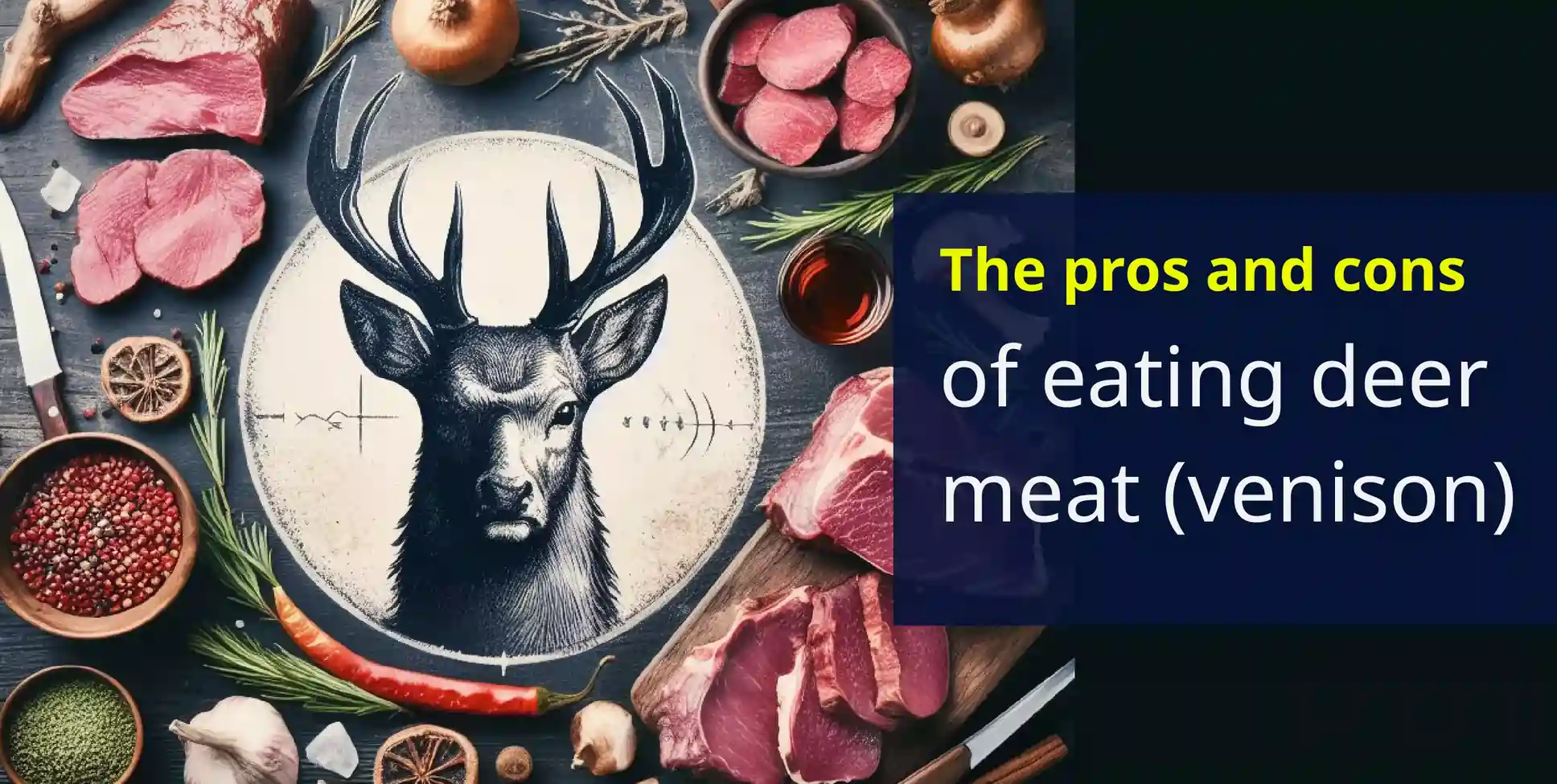The pros and cons of eating deer meat (venison)
19-Jul-2024

Mark Eves
Deer meat, commonly known as venison, has been a staple in many diets for centuries. It's praised for its lean and gamey flavour, but like any food, it comes with its own set of advantages and disadvantages. In this blog, we'll explore both the pros and cons of consuming deer meat.
The pros of eating deer meat (venison)
Lean and nutrient-dense: Venison is incredibly lean, making it a healthy source of protein. It's lower in fat compared to beef, making it an excellent choice for those looking to reduce their saturated fat intake. Additionally, it's packed with essential nutrients such as iron, zinc, and B vitamins.
Low in calories: Venison is relatively low in calories, making it an ideal option for individuals on calorie-restricted diets. A 3.5-ounce (100-gram) serving of cooked venison contains around 158 calories, making it a suitable choice for weight management.
High-quality protein: Venison is rich in high-quality protein, which is essential for muscle growth and repair. It contains all the essential amino acids required by the human body.
Free-range and sustainable: In many cases, venison comes from wild deer, which are free-range animals. This means they have lived in their natural habitat, leading to meat that is free of antibiotics and hormones. Harvesting wild deer can also be considered a sustainable choice, as it doesn't contribute to factory farming practices.
Unique flavour: Venison offers a unique and distinctive flavour. Its gamey taste is appreciated by those who enjoy a rich and robust culinary experience. It can be used to create a variety of dishes, adding depth and complexity to recipes.
The cons of eating deer meat (venison)
Taste preferences: While the gamey flavour of venison is a pro for many, it can be a con for those who prefer milder-tasting meats. Some people find venison's strong taste unappealing, which can limit its appeal to a broader audience.
Toughness: Venison can be tougher compared to other meats, especially if not prepared and cooked correctly. Overcooking can result in dry and chewy meat.
Availability: In many regions, venison may not be readily available in supermarkets or local markets. It may require hunting or sourcing from speciality butchers or game farms, which can limit access for some consumers.
Potential health risks: Wild deer may carry diseases such as chronic wasting disease (CWD) or bovine tuberculosis (TB). While the risk of transmission to humans is low, it is essential to follow proper food safety guidelines when handling and cooking venison.
Environmental impact: In areas with overpopulations of deer, their presence can negatively impact local ecosystems, leading to overgrazing and habitat destruction. Managing deer populations through hunting is sometimes necessary to maintain a balanced ecosystem.
So as obviously we are a pro-hunting group, let's provide counterarguments to the cons of eating deer meat (venison) mentioned above for a more balanced perspective:
Counterarguments to the cons of eating deer meat (venison)
Taste preferences: While venison has a distinctive flavour that some may find strong, it can be prepared in various ways to moderate its taste. Marinating, slow cooking, or incorporating it into flavorful dishes can mellow the gamey flavour, making it more appealing to a broader audience. Additionally, for those who enjoy the unique taste, the gamey flavour is a pro rather than a con.
Toughness: The perceived toughness of venison can be managed through proper cooking techniques. Slow cooking methods, such as braising or stewing, can result in tender and succulent meat. Moreover, using venison in dishes like chili, stews, or meat pies can showcase its flavour while keeping it tender. I would counter-argue any one who would say beef filet if better than venison.
Availability: While venison may not be as readily available as beef or chicken in some regions, its increasing popularity has led to more accessible sourcing options. Many speciality butchers, farmers' markets, and online retailers now offer venison products, expanding its availability to a broader consumer base.
Potential health risks: The risk of contracting diseases from properly prepared and cooked venison is minimal. By following recommended food safety guidelines, such as cooking to appropriate temperatures and avoiding consumption of high-risk tissues, consumers can enjoy venison without undue health concerns.
Environmental impact: While it's true that deer populations can negatively impact ecosystems in certain regions, responsible deer management practices, including regulated hunting, do address these issues. Well-managed hunting prevents overpopulation, which can lead to habitat destruction and food shortages for deer themselves, ultimately promoting a healthier ecosystem.
In conclusion, the cons associated with eating deer meat (venison) can often be mitigated or balanced by various factors, including culinary techniques, increasing availability, responsible sourcing, and proper food safety measures. Ultimately, venison's unique taste and nutritional benefits make it a valuable addition to many diets, and addressing these concerns can make it a more appealing choice for a wider range of consumers.
Venison, or deer meat, offers a range of nutritional benefits and unique flavours that many people find appealing. Its leanness and nutrient density make it a healthy choice, while its distinctive taste can add variety to one's diet. However, individual taste preferences, potential toughness, and limited availability may be drawbacks for some consumers. It's essential to consider both the pros and cons of eating deer meat and make an informed choice based on personal preferences, dietary needs, and ethical considerations. Additionally, following proper food safety guidelines is crucial to ensure a safe and enjoyable dining experience when consuming venison.
Must read:
- Browning B15 vs. Beretta EELL: The case for the browning beauty
- The AR-15 .22LR rifle in the UK: Dispelling myths and embracing fun
- Managing effective beating for pheasant shooting: A comprehensive guide
- How do you apply for a firearms or shotgun license in UK?
- The ripple effect: A world without deer hunting in the UK
